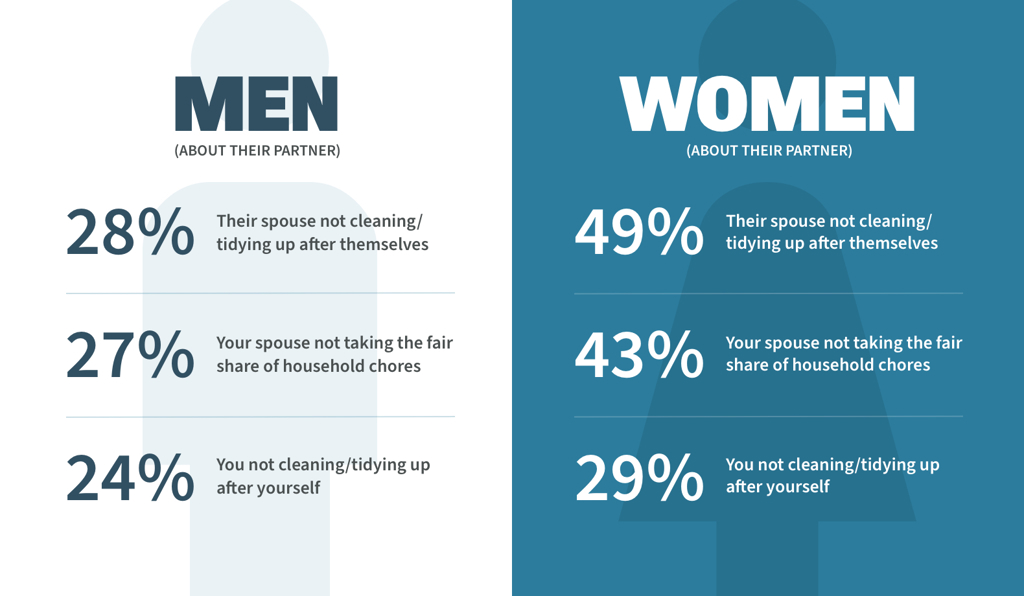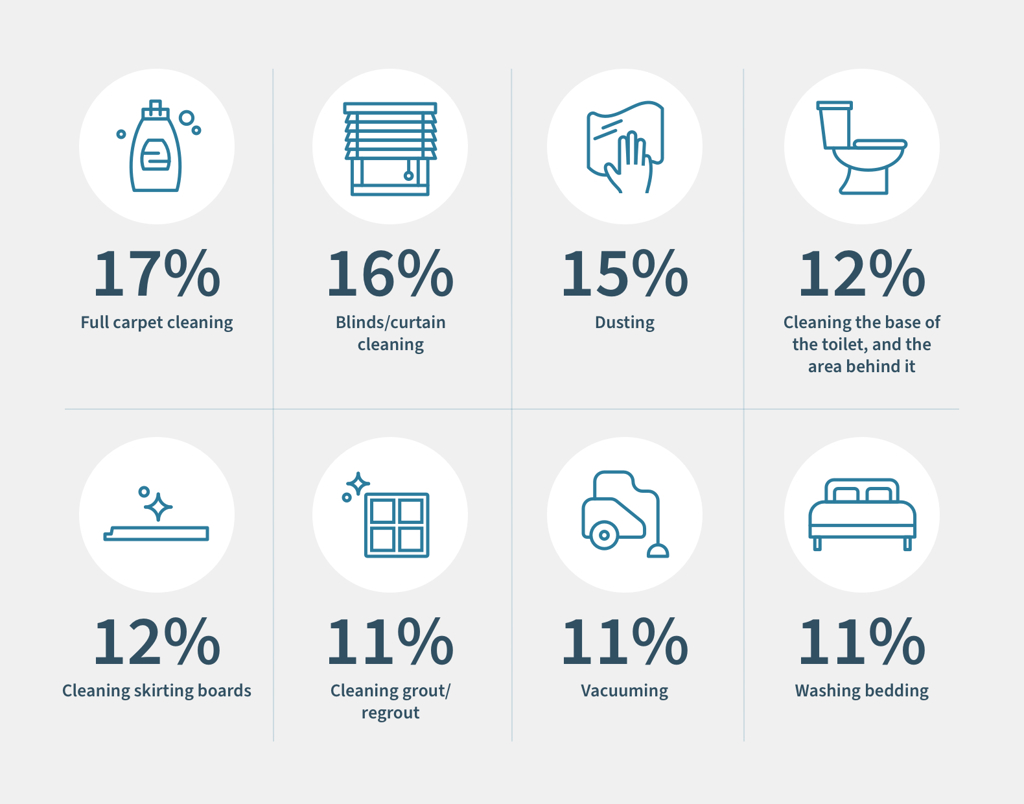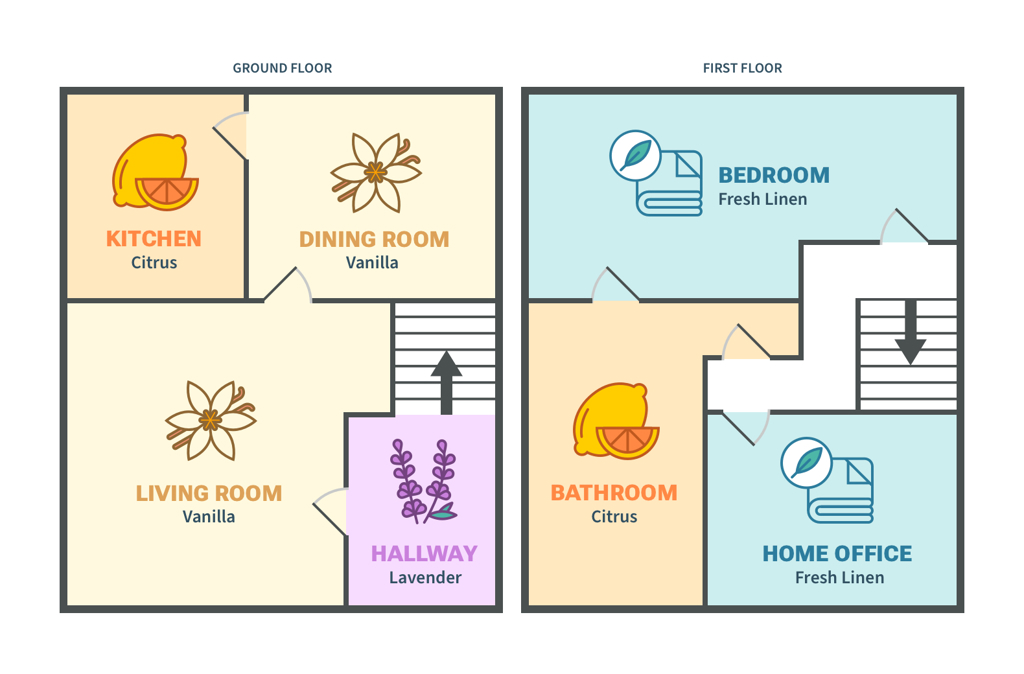An Introduction
Before the pandemic, many Brits would typically use their weekends to clean, especially if they worked in an office Monday to Friday. And then, a seismic shift; Coronavirus forced the majority of us to work from home, with not much else to do for quite some time.
The extra time spent at home, coupled with the nature of Covid-19, meant we became more aware of general cleanliness. And, it's thought that one in five Brits took on additional cleaning measures as a result of the pandemic.*
Fast forward to now, and although we’ve returned to normality - or created a new normal, at least - the commonality of working from home and hybrid working means we are still spending more time in our house compared to a few years ago. With this comes more freedom to clean when it suits us. We no longer have to be confined to a weekend blitz, and as you’ll read in this report, we’re not.
To discover more about our cleaning habits and how they’ve changed since Covid-19, Tap Warehouse carried out a survey of 1,000 Brits. Here are the results, with some surprising insights.
The UK Cleaning Habits Report - the results!
Use these links to jump to a specific part of the report or keep reading to view the report in full.
Six in ten Brits admit to cleaning in between work tasks
Housework - who is doing more chores?
Top 10 list of the household chores we love to hate!
The most common reasons for an argument
Eight in ten Brits have a cleaning blitz in preparation for a guest
Top scents per room in the home
Buying eco-friendly cleaning products is more of a priority for male consumers
Full Report
Keep reading for a full breakdown of all the data or jump to a specific section using the links above.
Six in ten Brits admit to cleaning in between work tasks

Most people spend up to ten hours cleaning each week, with two in every three dedicating around five hours to household chores. This may or may not align with your own habits - but here’s where it gets more interesting.
While Brits are still more likely to clean on a Saturday morning, compared to any other day or time of the week, more people clean on a Monday overall, with 810 participants saying they tidy on a Monday. For Saturday it’s 785, and Sunday, 725.
Perhaps it’s our way of kickstarting our week and employing some #Mondaymotivation?
For many of us, the additional flexibility of our jobs enable us to do some basic cleaning tasks throughout the day. Six in ten Brits admit to cleaning up between work tasks, while a third say midday/during their lunch break is their preferred time to do a spruce.
Our data also encapsulates the difference between those who primarily work in an office vs those who primarily work from home. Among the latter, 48% say they do some cleaning during their lunch break.
Elissa Thursfield, Consultant Solicitor in the employment law team at Richard Nelson LLP, offers a legal perspective: “If an employee has been approved to work either on a hybrid, remote or at home basis this does not necessarily mean they can work flexibly in terms of their hours. It is purely an agreement for their work location to be changed.
“Where the contract of employment specifies set working hours, and if an employee is not completing them due to undertaking personal tasks, this could be classed as very serious misconduct that in some cases could result in dismissal.
“It would be unfair to penalise an employee when you haven’t set out your expectations and the rules you expect employees to follow when working from home. For example, whilst it might be unreasonable to spend an hour of the working day cleaning the house, is it really unreasonable to take a couple of minutes to let the dog out or answer the door to the postman?
“Employers should determine what the boundaries are and where there is flexibility, particularly if they are going to start enforcing consequences.”
Housework - who is doing more chores?

Go back a few decades and you’ll learn how housework and the care of children was considered the primary role of a woman.
But what about now, in 2023? Well, according to 19% of our participants - who all live with their partner - the chores are split 50/50.
And while it’s true that more women claim to do more than half of the housework (78%), or all of the housework (20%), there are plenty of men doing more than the lion’s share. Four in ten men say they do more than half of the housework, while 7% of men do all the housework.
It’s fair to say that the above is conducive for arguments. More than a quarter of Brits have had a spat with their partner over cleaning duties within the last week (28%), and more than half have argued within the last month. Credit goes to those 295 participants who claim to have never argued over cleaning responsibilities!
Here are the most common reasons for an argument, broken down by gender:

Men (about their partner)
- Their spouse not cleaning/tidying up after themselves (28%)
- Your spouse not taking the fair share of household chores (27%)
- You not cleaning/tidying up after yourself (24%)
Women (about their partner)
- Their spouse not cleaning/tidying up after themselves (49%)
- Their spouse not taking the fair share of household chores (43%)
- Your spouse expecting you to clean/tidy up their mess (29%)
We also have the lowdown on our partner’s worst cleaning habits, which makes the above make so much sense:
Men (about their partner)
- Leaving dirty dishes in the sink for extended periods (25%)
- Not cleaning up after cooking (23%)
- Failing to put away belongings or clutter (23%)
Women (about their partner)
- Leaving clothes or personal items left around the house (34%)
- Failing to put away belongings or clutter (33%)
- Leaving dirty dishes in the sink for extended periods (24%)
Alicia Ortega, COAMFTE accredited marriage and family therapist, has some advice for those who tend to argue over housework:
“Communication, as always, is key. Couples should engage in open dialogues about priorities and expectations. But these are not 'one and done' discussions. Rather, it should be an ongoing conversation, adapting to life changes and evolving perspectives.
“Next, couples need to anticipate and plan for roadblocks. Maybe one partner is terrible at cooking, or perhaps work schedules fluctuate wildly. It's important to plan for these variables. Timelines and schedules can also be helpful tools. Just like a business meeting, cleaning tasks can be scheduled and followed.
“Reevaluation is another crucial step. What worked six months ago might not work now, and it's important to revise strategies as needed. It's not about clinging to a system but finding what works best at any given point in time.
“And lastly, there's no shame in outsourcing. If your budget allows it, consider hiring help for certain tasks. It could save a lot of stress and make more time for couples to enjoy each other's company.
“In the end, navigating household chores as a couple isn't merely about cleaning up - it's a delicate dance of empathy, mutual respect and communication. It's about ensuring that all contributions are recognised and valued, creating a harmonious home where love, not resentment, grows.”
The household chores we love to hate!

Interestingly, the practice of using an application of heat to smooth fabrics goes back many centuries - in fact, as early as 1BC. The electric iron was invented in 1882, by Henry Seely White.
Now, ironing is seen as a thing of the past, at least by some generations. There is no shortage of articles pointing the finger at millennials for the decline in sales of irons, with the Daily Mail* reporting that two-thirds of this generation don’t even know how to use an iron!
There are, however, many reasons behind this societal change. Firstly, we have steamers now, and even sprays that help to get the wrinkles out of clothes. Secondly, we have tumble dryers with some nifty settings. And thirdly, it’s likely that our relaxed attitude to fashion has a part to play.
It makes sense then, that ironing - and even steam cleaning - clothes is the number one task we love to hate, voted by 29% of respondents.
Cleaning the oven comes very close behind, in second place, chosen by 28% of Brits.
Here are the other eight tasks that make up the top ten:

- Ironing Clothes (29%)
- Cleaning the oven (28%)
- Full carpet cleaning (17%)
- Blinds/curtain cleaning (16%)
- Dusting (15%)
- Cleaning the base of the toilet, and the area behind it (14%)
- Cleaning skirting boards (12%)
- Cleaning grout/regrout (11%)
- Vacuuming (11%)
- Washing bedding (11%)
Eight in ten Brits have a cleaning blitz in preparation for a guest

It may come as no surprise that most of us will spend at least some time preparing for a visitor.
More than half of women (52%) will typically spend up to an hour having a quick spruce, while an extra 30% will spend between one and two hours.
For men, the statistics are similar at 50% and 28% respectively.
Both genders are also likely to complete the same household tasks in anticipation of a guest, with the top five chores being vacuuming, wiping surfaces, dusting, cleaning/bleaching the toilet and cleaning sinks.
For the latter, it’s worth noting that not all kitchen taps can be cleaned in the same way; doing so can actually cause damage, depending on the material.
For matte black taps, stay away from harsh chemical cleaners, instead opting for a soft cloth and warm soapy water. For a deeper clean, the trick is to use vinegar to dissolve a limescale build up. All you need to do is mix an equal amount of vinegar and water in a bowl and then use a cloth to scrub the taps with the mixture.
Brass taps demand a certain level of care and maintenance in order to get the desired sparkling finish.
If they’re not scrubbed right, it’s likely that the colour will begin to fade, tarnish or even turn green! Similarly to the matt black taps, soapy water and a soft cloth will be sufficient, but if you’re looking for that deep spring clean that will leave your kitchen spotless and rid of any germs, the trick is to use a lemon.
The acidity of lemons make them great at removing limescale, which can be a massive save in kitchens and bathrooms. All that needs to be done is to rub the lemon flesh on the taps and thoroughly rinse with clean water.
And what better way to end your cleaning ritual than with a spritz of room spray!
With more than half** of us worrying that our home smells, we're spending over a £100** on items to improve its aroma. As part of our research, we dived into this further, asking participants to choose their favourite scents per room.
Here’s what we found are the top scents per room in the home:

- Hallway - lavender
- Living room - vanilla
- Home office - fresh linen
- Dining room - vanilla
- Kitchen - citrus
- Bedroom - fresh linen
- Bathroom - citrus
Dr Becky Spelman, psychologist and founder at Private Therapy Clinic, explains the association with some of our favourite scents:
- Lavender: Lavender is often associated with relaxation and calmness. It has soothing properties that can help reduce stress and anxiety. It may promote better sleep and create a sense of tranquillity, making it suitable for the hallway and bedroom.
- Vanilla: Vanilla is often considered comforting and warm. It has a sweet and inviting aroma that can create a cosy atmosphere. Vanilla is known to have a calming effect and may help reduce stress and enhance relaxation, making it suitable for the living room and dining room.
- Fresh Linen: Fresh linen scents are often associated with cleanliness and freshness. They can create a sense of purity and make the space feel crisp and clean. Fresh linen fragrances are commonly used in areas where people want to promote a sense of cleanliness and clarity, such as the home office and bedroom.
- Citrus: Citrus scents, such as lemon or orange, are known for their invigorating and refreshing qualities. They can help uplift the mood, increase energy levels, and promote a feeling of freshness. Citrus fragrances are often used in areas like the kitchen and bathroom, where people want to create a clean and energising environment.
Buying eco-friendly cleaning products is more of a priority for male consumers

Studies show that there has been a notable shift in consumer behaviour in recent years as more individuals embrace eco-consciousness. There are so many areas where people can adopt more sustainable practices, from the food they consume to the clothes they wear, and of course extends to the products they use in the home.
We asked participants how important it is for them to use eco-friendly cleaning products as part of their cleaning routine.
Here’s how they voted:
- Extremely important - 12%
- Important - 29%
- Somewhat important - 29%
- Neutral/no preference - 20%
- Somewhat unimportant - 5%
- Not important - 5%
When looking at a gender breakdown, 46% of men voted “extremely important” or “important”, compared to 36% of women.
For consumers, choosing non-toxic products that are free from harmful chemicals that may pose risks to human health or the environment is the biggest consideration.
Many also look at the environmental impact of the items they’re buying, particularly focusing on the lifecycle from production to disposal, and whether a product is biodegradable and/or labelled as ‘environmentally friendly’.
Products that contain natural or plant-based ingredients is the third biggest priority for those purchasing eco-friendly cleaning items.
You might not think it, but there are a wide range of everyday food and drink items that can be used as part of your cleaning routine. Not only are they easily affordable, they’re also more eco-friendly.
Here are five products you can use to keep your household appliances spick-and-span:
1. Coffee
We all know coffee is perfect for your morning boost, but it can also be used to remove tough stains on worktop surfaces. Simply sprinkle some instant coffee in with hot, soapy water and give it some elbow grease. As coffee is acidic, it will be able to cut through the grime with ease.
If you like to brew your own coffee, one other use of the coffee grounds is their ability to deodorise. If your refrigerator has a funny smell, pour some coffee grounds into a bowl and place it in the fridge until it has absorbed the unwanted odour.
Some people also like to line their bin (underneath the bin bag) with coffee to neutralise any smells given off by household waste.
2. Tea bags
If you're more of a tea drinker and like to let your dishes soak when washing up, this tip could be perfect for you. Making a big pasta bake or shepherd's pie is very rewarding until you have to deal with the oven dish afterwards which is always a nightmare to clean!
Try throwing in a few tea bags and letting the dish soak overnight. The tannins in the tea will loosen the grime and you can simply rinse the tough stains away the next morning, hassle- free.
3. Lemon
Lemons are fantastic for just about anything, so don’t throw them out once you’ve finished with them! This zesty fruit can work wonders in the bathroom; simply rub the flesh on to chrome taps or faucets and rinse with clean water - it’ll help to remove a build up of limescale, leaving your bathroom amenities sparkling once again.
It’s important, however, to ensure the lemon juice isn’t left on to soak for more than a couple of minutes before rinsing as this may tarnish the finish of your tap.
4. Mayonnaise
We’ve all been there, leaving a glass or mug on a wooden table only to realise once you pick it up there is a ringed stain left behind. One great product to remove those eye sore stains is actually mayonnaise.
Squirt a small amount of sauce onto a paper towel and place it over the stain with a little pressure. Then, leave the towel for around 20 minutes before removing it and polishing the stain with a clean cloth to see the results.
5. Ketchup
Another condiment you will likely have in your cupboard (or fridge, depending on your take on the popular debate) is red sauce. If, like a lot of people, you have delved into copper cookware, you may be starting to notice that they look a little dull and tarnished since you first bought them.
To fix this, squeeze a decent dollop of ketchup onto a cloth and, using circular motions, scrub the tarnished area of the pots and pans - they will be back to their bright, shiny best in no time.
That concludes the Household Cleaning Habits Report, commissioned by Tap Warehouse. The report surveyed 1,000 UK workers asking them about their cleaning routines and cleaning habits and how they may have changed since Covid-19.
(*Additional data from research conducted by Halo Appliances in 2021 and **Scentsy in 2022.)
What Type of Cleaner Are You?
Wondering how you measure up with your own cleaning habits? Take our cleaning quiz to find out what type of cleaner you are!








